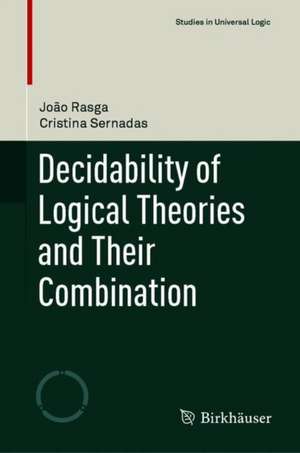Decidability of Logical Theories and Their Combination: Studies in Universal Logic
Autor João Rasga, Cristina Sernadasen Limba Engleză Hardback – 21 oct 2020
After an overview of basic first-order logic concepts, the authors discuss some model-theoretic notions like embeddings, diagrams, and elementary substructures. The text then goes on to explore an applicable way to deduce logical consequences from a given theory and presents sufficient conditions for a theory to be decidable. The chapters that follow focus on quantifier elimination, decidability of the combination of first-order theories and the basics of computability theory.
The inclusion of a chapter on Gentzen calculus, cut elimination, and Craig interpolation, as well as a chapter on combination of theories and preservation of decidability, help to set this volume apart from similar books in the field.
Decidability of Logical Theories and their Combination is ideal for graduate students of Mathematics and is equally suitable for Computer Science, Philosophy and Physics students who are interested in gaining a deeper understanding of the subject. The book is also directed to researchers that intend to get acquainted with first-order theories and their combination.
Din seria Studies in Universal Logic
- 17%
 Preț: 365.02 lei
Preț: 365.02 lei -
 Preț: 383.99 lei
Preț: 383.99 lei - 15%
 Preț: 648.34 lei
Preț: 648.34 lei -
 Preț: 396.36 lei
Preț: 396.36 lei - 15%
 Preț: 577.20 lei
Preț: 577.20 lei -
 Preț: 394.46 lei
Preț: 394.46 lei - 15%
 Preț: 633.74 lei
Preț: 633.74 lei - 15%
 Preț: 639.24 lei
Preț: 639.24 lei -
 Preț: 392.95 lei
Preț: 392.95 lei -
 Preț: 403.06 lei
Preț: 403.06 lei -
 Preț: 381.28 lei
Preț: 381.28 lei -
 Preț: 386.26 lei
Preț: 386.26 lei - 15%
 Preț: 528.33 lei
Preț: 528.33 lei - 24%
 Preț: 802.17 lei
Preț: 802.17 lei - 15%
 Preț: 583.85 lei
Preț: 583.85 lei - 15%
 Preț: 587.76 lei
Preț: 587.76 lei - 15%
 Preț: 692.19 lei
Preț: 692.19 lei - 18%
 Preț: 946.62 lei
Preț: 946.62 lei - 18%
 Preț: 1121.62 lei
Preț: 1121.62 lei - 15%
 Preț: 637.96 lei
Preț: 637.96 lei - 18%
 Preț: 776.36 lei
Preț: 776.36 lei - 18%
 Preț: 781.99 lei
Preț: 781.99 lei -
 Preț: 335.51 lei
Preț: 335.51 lei - 18%
 Preț: 1111.19 lei
Preț: 1111.19 lei
Preț: 450.84 lei
Nou
Puncte Express: 676
Preț estimativ în valută:
86.34€ • 88.11$ • 72.64£
86.34€ • 88.11$ • 72.64£
Carte disponibilă
Livrare economică 05-19 februarie
Preluare comenzi: 021 569.72.76
Specificații
ISBN-13: 9783030565534
ISBN-10: 303056553X
Pagini: 178
Ilustrații: XIII, 178 p. 70 illus., 1 illus. in color.
Dimensiuni: 155 x 235 mm
Greutate: 0.41 kg
Ediția:1st ed. 2020
Editura: Springer International Publishing
Colecția Birkhäuser
Seria Studies in Universal Logic
Locul publicării:Cham, Switzerland
ISBN-10: 303056553X
Pagini: 178
Ilustrații: XIII, 178 p. 70 illus., 1 illus. in color.
Dimensiuni: 155 x 235 mm
Greutate: 0.41 kg
Ediția:1st ed. 2020
Editura: Springer International Publishing
Colecția Birkhäuser
Seria Studies in Universal Logic
Locul publicării:Cham, Switzerland
Cuprins
Chapter 1: First Order Logic.- Chapter 2: Reasoning with Theories.- Chapter 3: Decidability Results on Theories.- Chapter 4: Quantifier Elimination.- Chapter 5: Combination of Theories.- Appendix: Basics of Computability.- Bibliography.- Table of Symbols.- Subject Index.
Notă biografică
João Rasga is an Associate Professor and Cristina Sernadas is a Full Professor at the Mathematics Department of Instituto Superior Técnico
Textul de pe ultima copertă
This textbook provides a self-contained introduction to decidability of first-order theories and their combination. The technical material is presented in a systematic and universal way and illustrated with plenty of examples and a range of proposed exercises.
After an overview of basic first-order logic concepts, the authors discuss some model-theoretic notions like embeddings, diagrams, and elementary substructures. The text then goes on to explore an applicable way to deduce logical consequences from a given theory and presents sufficient conditions for a theory to be decidable. The chapters that follow focus on quantifier elimination, decidability of the combination of first-order theories and the basics of computability theory.
The inclusion of a chapter on Gentzen calculus, cut elimination, and Craig interpolation, as well as a chapter on combination of theories and preservation of decidability, help to set this volume apart from similar books in the field.
Decidability of Logical Theories and their Combination is ideal for graduate students of Mathematics and is equally suitable for Computer Science, Philosophy and Physics students who are interested in gaining a deeper understanding of the subject. The book is also directed to researchers that intend to get acquainted with first-order theories and their combination.
Caracteristici
Provides a comprehensive, self-contained introduction to decidability of first-order theories, using detailed proofs and examples to illustrate and clarify complex concepts Incorporates computability theory and reduction techniques to determine the decidability of theories Illustrates a variety of ways to deduce logical consequences from a theory, including the use of Gentzen calculus for first-order logic
